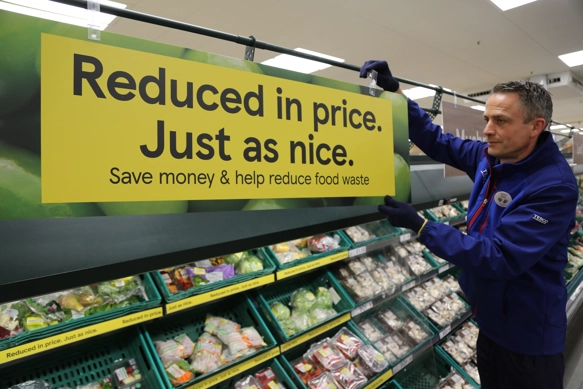Tesco, one of the United Kingdom’s largest supermarket chains, has unveiled an ambitious sustainability programme aimed at dramatically reducing food waste across its national network of stores. The announcement, made this week, comes as retailers face mounting pressure from consumers, regulators, and environmental organisations to minimise the environmental footprint of food distribution and sales. Tesco’s latest initiative demonstrates the chain’s commitment to addressing waste, improving operational efficiency, and reinforcing its role as a socially responsible corporate citizen.
The Scale of the Challenge
Food waste remains a significant global problem, with estimates suggesting that one-third of all food produced is lost or wasted before reaching consumers. In the UK alone, over 9 million tonnes of food are wasted annually, contributing to greenhouse gas emissions and representing a considerable loss of resources. Supermarkets, as the final link in the supply chain, play a critical role in managing and reducing this waste.
For Tesco, addressing food waste is both a moral and business imperative. Unsold stock represents lost revenue, unnecessary disposal costs, and reputational risk, while proactive measures can improve efficiency, reduce environmental impact, and enhance consumer trust.
The Sustainability Programme
Tesco’s new initiative comprises several interlinked strategies:
-
Improved Inventory Management – By leveraging predictive analytics and advanced demand forecasting, stores can better match stock levels with anticipated consumer demand, reducing the likelihood of surplus inventory.
-
Dynamic Pricing Models – Fresh produce and perishable items nearing the end of their shelf life will be offered at discounted rates to encourage purchase rather than disposal.
-
Partnerships with Food Redistribution Organisations – Surplus food will be donated to charities and community groups, helping to support vulnerable populations while minimising waste.
-
Employee Training and Awareness – Staff across all Tesco stores are being trained in best practices for stock rotation, handling, and monitoring expiry dates.
-
Consumer Engagement – Tesco is educating shoppers on food storage, recipe ideas, and portion planning to help reduce household waste.
Together, these measures form a comprehensive approach designed to target food waste at multiple points in the retail journey, from supplier delivery to customer purchase.
Technology and Data-Driven Solutions
A central component of Tesco’s programme is the deployment of data-driven solutions to optimise stock levels and reduce spoilage. Predictive algorithms analyse historical sales patterns, seasonal trends, and real-time purchase behaviour to forecast demand accurately. This enables stores to adjust order quantities proactively, ensuring that fresh food is available without excessive overstock.
In addition, Tesco is experimenting with AI-based shelf monitoring systems that track the condition and turnover of perishable items. These systems can alert staff to potential issues before products reach their expiration dates, allowing timely redistribution, markdowns, or donations.
The Role of Employees and Store-Level Implementation
While technology plays a critical role, human oversight remains essential. Tesco is equipping store managers and floor staff with enhanced training programmes focused on:
-
Efficient stock rotation and handling
-
Identifying items approaching expiry
-
Coordinating with local charities for redistribution
-
Communicating promotional offers effectively to customers
The combination of data insights and trained personnel ensures that the programme operates effectively at scale across thousands of locations nationwide.
Consumer Benefits
Reducing food waste is not only environmentally responsible but also creates tangible benefits for consumers. Shoppers can expect:
-
Lower prices on perishable items through targeted promotions
-
Access to a wider range of fresh products, as inventory is managed more efficiently
-
Educational resources for minimising household food waste
-
Improved confidence that the supermarket is committed to sustainable practices
By connecting environmental initiatives with customer engagement, Tesco positions itself as both a responsible retailer and a trusted partner in reducing waste at home.
Competitive Implications
Tesco’s sustainability programme sets a benchmark in the UK grocery sector. Competitors such as Sainsbury’s, Asda, and Morrisons are also pursuing waste-reduction initiatives, but Tesco’s comprehensive approach — combining technology, employee training, and community engagement — represents one of the most ambitious efforts to date.
Analysts suggest that retailers who succeed in reducing food waste will gain both financial and reputational advantages. Minimising unsold stock lowers disposal costs and maximises revenue, while demonstrating social responsibility enhances brand loyalty in an increasingly environmentally conscious market.
Environmental and Social Impact
Beyond financial benefits, Tesco’s programme addresses pressing environmental and social challenges. By reducing waste, the chain directly contributes to lowering greenhouse gas emissions and conserving natural resources used in food production. Redistribution of surplus food to charities also addresses food insecurity, providing vital support to individuals and communities in need.
As such, the initiative exemplifies how large retailers can simultaneously achieve operational efficiency, environmental stewardship, and social responsibility.
Future Prospects and Expansion
Tesco plans to roll out the programme fully across all UK stores over the next two years. The chain is also exploring partnerships with suppliers to implement waste-reduction measures upstream in the supply chain, further minimising losses before products even reach stores.
Looking ahead, Tesco’s efforts could influence policy and set a precedent for international operations. With food waste a global concern, lessons learned in the UK may inform similar strategies in Tesco’s markets across Europe, Asia, and North America.
Conclusion
Tesco’s new sustainability initiative represents a significant step forward in the fight against food waste. By combining data-driven technology, staff training, community partnerships, and consumer engagement, the retailer is addressing one of the most pressing challenges in modern grocery retail. Beyond operational and financial benefits, the programme demonstrates that supermarkets can be leaders in environmental responsibility and social impact. As Tesco continues to refine and expand this strategy, it sets a benchmark for the grocery sector, showing that sustainability and business performance can go hand in hand.


